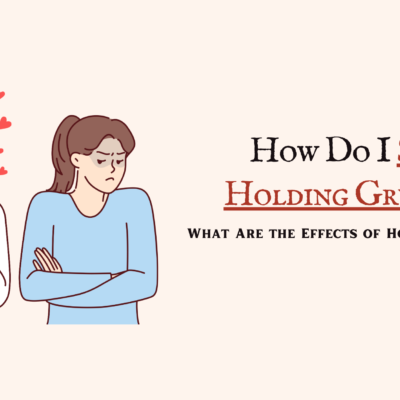How Do I Stop Holding Grudges: Grudges are like heavy baggage we carry throughout life, loading our hearts and minds with negativity. Holding onto grudges not only impacts our mental health but also weakens our relationships and slows down our personal growth.
However, letting go of grudges is easier said than done. It needs mindful effort, self-reflection, and a readiness to forgive. In this article, we will talk about the harmful effects of holding grudges, understand the psychology behind them, and delve into practical techniques to remove their hold on our lives.
Also Read:
- Signs You Are a Free Spirit.
- How to Appear More Confident and Attractive (when you are really not)?
- How to Develop Empathetic Listening Skills?
- How to Improve Emotional Wellness at Work?
- How to Reframe Negative Thoughts?
What Are Grudges?
A grudge is an emotional response to a wrongdoing or offense. It arises from feelings of irritation, anger, and betrayal towards the person or situation that induced the hurt. While it is normal to experience these emotions when we have been wronged, holding onto them long after the event has passed is harmful to our well-being.
Psychologically, holding grudges is a form of thought—a repetitive, negative thought pattern where we replay past events and stay on the associated emotions. This thought not only keeps us stuck in the past but also increases our negative feelings, which leads to increased stress, anxiety, and even depression. Moreover, holding bitterness prevents us from experiencing true peace and happiness in the current moment.
What Are the Effects of Holding Grudges?
Strained Relationships
Holding grudges can destroy your relationships, causing distance and distrust between people. Resentment builds walls that interfere with open communication and genuine connection, leading to a breakdown in closeness and understanding.
Negative Effect on Health
The stress and negative emotions connected with holding grudges can be bad for your physical health as well. Chronic stress has been linked to a host of health problems, including hypertension, a weakened immune system, and an increased risk of heart disease.
Stops Our Personal Growth
When we are preoccupied with past grievances, we find it hard to focus on personal growth and self-improvement. Holding grudges keeps us stuck in a cycle of resentment and victimhood, stopping us from moving forward and welcoming new opportunities.
Emotional Disruption
Carrying the weight of unresolved irritation can lead to chronic feelings of anger, sadness, and frustration. This emotional turmoil not only affects our mental well-being but also spills over into other areas of our lives, affecting our work, social interactions, and overall sense of satisfaction.
How Do I Stop Holding Grudges?
Practice Empathy
One of the most powerful remedies to grudges is empathy. Try to put yourself in the other person’s shoes and understand their mindset. Understand that we all make mistakes and that holding onto anger only increases suffering, both for yourself and others.
Forgive Others
Forgiveness is not about favoring the hurtful actions of others; instead, it is a conscious decision to release the negative emotions connected with the offense. Practice forgiveness as a gift to yourself, freeing yourself from the burden of bitterness and reclaiming your emotional well-being.
Engage in Self-Reflection
Take time to reflect on the underlying reasons for your resentment. Are there unresolved issues from your past that are contributing to your feelings of anger and betrayal? By handling these underlying wounds, you can begin to heal and move ahead with greater clarity and understanding.
Practice Mindfulness
Mindfulness techniques, such as meditation and deep breathing, can help you stay present and develop a sense of inner peace. When you find yourself living on past grievances, gently redirect your attention to the present moment and concentrate on what you can control.
Set Boundaries
Sometimes, letting go of a grudge may include setting healthy boundaries with the person who hurt you. Communicate your needs and expectations, and take a step back for yourself if those boundaries are broken. Remember that boundaries are important for protecting your emotional health.
Ask For Support
Don’t hesitate to reach out to friends, family, or a therapist for support. Talking about your feelings with someone you trust can provide a different outlook, which can help you gain clarity and insight into your emotions.
Practice Gratitude
Develop a sense of gratitude for the positive parts of your life, even during hard times. Concentrating on what you are thankful for can redirect your mindset and help you let go of bitterness toward the things you cannot change.
At The End
Holding onto grudges is a heavy burden that weighs us down and stops us from living fully in the present moment. By understanding the psychology behind grudges and practicing forgiveness, empathy, and self-reflection, we can release the hold of resentment and reclaim our emotional freedom.
Letting go of grudges is a journey—one that requires patience, boldness, and a commitment to self-love and healing. As we release the past and embrace forgiveness, we open ourselves up to a future filled with peace, joy, and genuine connection.








